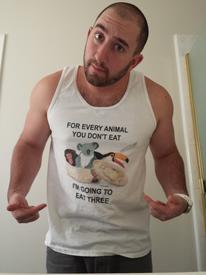Can metaboloc adaption be good?

youngcalorieburner
Posts: 45
So i heard that if you eat less than you need than eventually thatll b ur new maintenance. But if u usually burn 2000 and u exercise to burn 2500, will metabolic adaption occur and after a few months 2500 is the new maintenance. Also if ur suppose to b eating 2000 calories but begin to exercise on a daily basis and i burn 500 extra a day, but still eat 2000 this would mean that id lose 1lb a week, would my metabolism decrease becuase though im in a deficit itd be because of the extra exercise not decrease in food and thered b no need to adapt to a lower food intake because none the less im still eating what i need if i wasnt doing the exercise.
0
Replies
-
Metabolism adapts in an attempt to make calories in and calories out equal. If you eat less than you burn for an extended period of time, your metabolic capacity will shrink (burn less calories per day). If you eat more than you burn for an extended period of time, your metabolic capacity will grow (burn more calories per day).0
-
So doing lets say, hiit or weight lifting, but then eating back those calories will eventually speed up my metabolism so i vurn as much without the exercise?Metabolism adapts in an attempt to make calories in and calories out equal. If you eat less than you burn for an extended period of time, your metabolic capacity will shrink (burn less calories per day). If you eat more than you burn for an extended period of time, your metabolic capacity will grow (burn more calories per day).0 -
-
So doing lets say, hiit or weight lifting, but then eating back those calories will eventually speed up my metabolism so i vurn as much without the exercise?Metabolism adapts in an attempt to make calories in and calories out equal. If you eat less than you burn for an extended period of time, your metabolic capacity will shrink (burn less calories per day). If you eat more than you burn for an extended period of time, your metabolic capacity will grow (burn more calories per day).
No. Your metabolism doesn't increase just by eating more or exercising more. If you're burning 2,500 cals with exercise then that's your metabolism WITH exercise. You can't remove exercise and expect your body to burn the same amount of calories. Metabolic rate is dependent on muscle mass, weight, height, age, genetics and medical problems. You can't increase your basal metabolic rate unless you increase your body's need to burn more calories (e.g. by gaining weight, adding muscle). Outside of your BMR, metabolic rate is determined by activity levels and food thermogenesis (the process of expending energy through heat). Generally when you eat more than you need, you will be less hungry and this is your body's way of keeping your weight constant but if you ignore that and eat anyway then you just gain weight.
Your metabolism adapts when you eat less because 1. Less body weight requires less energy to maintain, 2. Diets tends to cause muscle loss which lowers BMR, 3. tries to conserve energy by making you more tired if it's not getting enough energy from food 4. Uses less energy to maintain regular normal function and 5. Makes you more hungry. It's a survival instinct the body has. This survival instinct does not come into play as much when we gain weight because our bodies only want to conserve energy in case of a famine so it won't burn extra fat or calories by eating more (apart from the thermogenic acts of digesting the food, which is small), it will just store excess calories as fat. The adaptation to a lower BMR is only by about 10% anyway, and some studies show that with prolonged dieting this never increases back up to the normal rate again.
Our bodies are designed to survive in a famine and therefore are more efficient at conserving or increasing fat stores than they are at burning them as anyone who has gained weight fast and then tried to lose it will know.0
Categories
- All Categories
- 1.4M Health, Wellness and Goals
- 393.3K Introduce Yourself
- 43.8K Getting Started
- 260.2K Health and Weight Loss
- 175.9K Food and Nutrition
- 47.4K Recipes
- 232.5K Fitness and Exercise
- 424 Sleep, Mindfulness and Overall Wellness
- 6.5K Goal: Maintaining Weight
- 8.5K Goal: Gaining Weight and Body Building
- 153K Motivation and Support
- 8K Challenges
- 1.3K Debate Club
- 96.3K Chit-Chat
- 2.5K Fun and Games
- 3.7K MyFitnessPal Information
- 24 News and Announcements
- 1.1K Feature Suggestions and Ideas
- 2.6K MyFitnessPal Tech Support Questions


